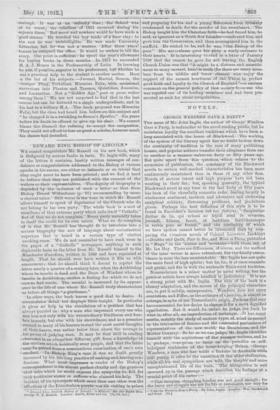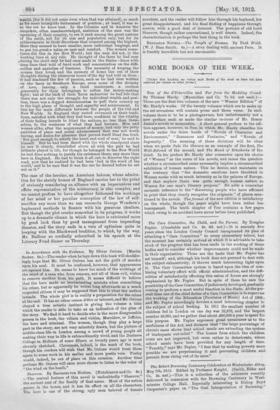NOVELS.
GEORGE WENDERN GAVE A PARTY.* TEE name of Mr. John Inglis, the author Of George..Wender'? Gave a Party, is unfamiliar to the novel-reading public, brit he maintains, loyally the excellent traditions which have been et longassociated•with the house of Blackwood. The working of the system of the literary agent has no dotibt broheit down the continuity of tradition in the case of many' publishing houses, and popular authors transfer their allegiance from one to another in a manner :unknown forty or fifty years:ago.
But quite apart from' this question; which relates to- the economics of publication, the constancy 'of • the Blackwood novels to certain well-marked characteristics has teen more continuously maintained than . in those of any other firm. Novels of serious intent and high purpoge 'have not been wanting in their list ; but, speaking generally, the typical Blackwood novel at any time in the last forty or fifty years has been of the cheerfully romantic order, dealing largely in wholesome sentiment, incident, and adventure and eschewing analytical subtlety, distressing , problems, and gratuitous gloom. Perhaps the. hest, definition 'Of this style is to be found in Facciolati's Lexicon dub voc. festivris.::"Sdepissiino dicitur de iis, qui urbani ac lepidi Stint in oermorie, jueunsli, hilaree, faceti, et laetitiain feetiOntenique in verbis prae se ferunt," and 'tlin continuity Of whiCh we have spoken cannot better be illustrated than by e0M- paring the vivacious novels 'of Colonel Laurence Lock ha'rt —Doubles and Quite, Fair to See, and Mine is Thine, publiSlied in " Maga" in the. 'sixties and 'seventies-withthose, say, 'of Mr. Ian Hay. There are differences; of course, and the method of the later 'writer is more robuetions; but thesfamilyseiens- blitnee is none the less unmistakable.' • Mr. Inglis has not-quite the same fund of high spirits;' but he, too, hi at'Oncercimitutie and genial, and fits in with the.anthdntic Blabltweed tradition.
Nomenclature is a minor matter' in motel but the greateat artists have always handled' it judiciously. It is not a strong point with :Mr. Inglis. The title of his book is a clumsy adaptation, and the names of the principal charaeters are, to put it mildly, unimpressive. Wendern does not carry conviction, and Fiffer, as the surname of aherOine,:is almost 'an outrage, in spite of her. Transatlantic origin. perhapstlitit may have accounted for her desire to cha,nge it for a more dignified appellation. But it would be. unfair to judge the hook by what is, after all, an imperfeetien•of teehnisne. ..It 44.s, many merits, notably the study et :various types, ot.miad immerged in' the intricacies of finance and the contrasted portraitere of representatives- of the . new world; the Dominions.: and, the Mother Country: So far as we eau judge4./SErAnglis identifies himself with' the aspirations -of- the. yeungess• nations, and he is, perhaps, over-prone to' insist ons the:parasitic or self- indulgent tendencies of the hont&keeping' Briton. George W'endern, a man Who' has madc a fortune in 'Australia while 'still young, is 'alive itmenities of the older civilization, while all.his. real .sympathies. are 'With the simpler and more unsophisticated life of the bush. —The antagonism. is well summed up. in the passage which deacribes his' feelings at a crucial point of . his career :- c This hurrying, struggling.London was not good enough ; for the hurry and struggle was not for.life or slistenannis, nor only for
• arc•rvejSelelern Gays a Party. ,13y, John Inglie. London : Vfni. Blablewobil , , and Sone. [pa.]
wealth (for it did not cease oven when that was attained), so much as for some intangible 'betterment of position ; at least, it was so in the set he knew best. In the Colonies and in America the ,unspoken, often nnacknowledged,. ambition of the men was the npraising of, their ceuritry, to see it rank among the great nations of the earth, not for its size and population only, but for its aChievements tliegri directions that counted among the highest. Here they seemed to have smaller, more individual longings, and to put tee great.a value, on ease and comfort. The women some- times did this in the New World; but the men did net, in the working time at any rite. Ho thought of the faces he had seen ,during the short etay he had once made in the States—faces with deep lines that told of hard work and concentration on the diffi- . eulties and anxietiee of business. The necessity of keeping the women they loved. and the memory of home ties out of their thoughts during the strenuous hours of the day had told on them ; 'it had deadened the' fire of passion, such as ho had seen written on the faces in Southern Europe, even some of the divinity . of, love, leaving. only a tired tenderness, a rootless generosity for their belongings to soften the money-making fight ; but at the back of their fierce endeavour he had felt that there was not only the struggle for individual wealth and posi- tion, there was a dogged determination to pull their country up to the high piano of thought and capacity and achievement. In this lay the main difference between the people of the Old and Now Worlds. In England they rested overmuch on their tradi- tions, satisfied with what they had been, confident in the vitality of their fading laurels to blind the nations, no less than them- selves, to the weakness of what they had become. Men and women alike, after the acquirement of money, had only the petty ambition of place and social advancement that was not worth having, and desire for pleasure that proved itself Dead Sea fruit. Not good enough to satisfy the heart and soul of man,' he said to himself. But he had been dazed with the whole standpoint since he saw it clearly, dissatisfied above all with the part he had hitherto played in life, for though he belonged to the New World he had done nothing to justify his existence there, any more than here in England. He had to think it all out, to discover the right road, now that he realized ho had been ' lost in the wood of the world,' and to be sure that it was the one he desired before he set out on it."
The case of the heroine, an American heiress, whose admira- tion for the stately homes of England carries her to the point of seriously considering an alliance with an impecunious and effete representative of the aristocracy, is also complex, and we cannot profess to have altogether fathomed the workings of her mind or her peculiar conception of the law of self- sacrifice any more than we can reconcile George Wendern's haphazard methods in finance with his generous idealism. But though the plot creaks somewhat in its progress, it works up to a dramatic climax in which the hero is extricated more by good luck than by good management from impending disaster, and the story ends in a vein of optimism quite in keeping with the Blackwood tradition, to which, by the way, Mr. Balfour so cordially subscribed in his speech at the Literary Fund dinner on Thursday.











































 Previous page
Previous page